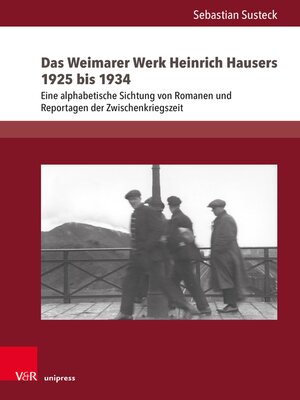Das Weimarer Werk Heinrich Hausers 1925 bis 1934
ebook ∣ Eine alphabetische Sichtung von Romanen und Reportagen der Zwischenkriegszeit · Literatur- und Mediengeschichte der Moderne
By Sebastian Susteck

Sign up to save your library
With an OverDrive account, you can save your favorite libraries for at-a-glance information about availability. Find out more about OverDrive accounts.
Find this title in Libby, the library reading app by OverDrive.



Search for a digital library with this title
Title found at these libraries:
| Library Name | Distance |
|---|---|
| Loading... |
Heinrich Hauser ist ein Zeitgenosse Ernst Jüngers und Oswald Spenglers und veröffentlicht zwischen 1925 und 1934 ein Dutzend Bücher: In Romanen und Reportagen behandelt Hauser Zeitgeschichte, Politik und Poetik. Der Schriftsteller, Journalist, Fotograf und Filmemacher kennt die Schwer- und Automobilindustrie wie die See- und Luftfahrt. Er berichtet aus Deutschland, Irland, Mexiko, den USA oder Australien. Dabei fühlt er avantgardistische Sehnsucht, wünscht sich eine unpolitische, aber konservative Existenz und gerät auf völkisch-nationalistische Irrwege. Der vorliegende Band liest Hausers Weimarer Buchveröffentlichungen aus und ordnet seine Gedanken anhand alphabetischer Stichworte von »Agrikultur« bis »Zukunft«. Er bietet damit einen Schlüssel zum Werk und ein Panorama der Zwischenkriegszeit. Heinrich Hauser is a contemporary of Ernst Jünger and Oswald Spengler. The writer, journalist, photographer and filmmaker Heinrich Hauser publishes a dozen books between 1925 and 1934. The novels and reportages deal with contemporary history, politics and poetics. Hauser was familiar with the heavy and automotive industries as well as seafaring and aviation. He reported from Germany, Ireland, Mexico, the USA or Australia. He dreamt of the avantgarde, desired an apolitical, yet conservative existence and fell into the nationalist trap. This volume conducts a reading of Hauser's Weimar book publications and organizes his thoughts using alphabetical keywords from "Agrikultur" to "Zukunft". It offers a key to his work and a panorama of the interwar period.







